15 alternatives to Adalo
- Jotform Apps: Best for creating custom apps from scratch or a template
- Caspio: Best for creating apps and widgets to embed on a website
- Lumavate: Best for storing large amounts of data in an app
- Quickbase: Best for creating apps with a large team
- Kintone: Best for simple, transparent pricing
- AppSheet: Best for using AI tools to help build apps
- SpreadsheetWeb: Best for converting Excel spreadsheets into apps
- Bubble: Best for collaborating on apps in real time
- Clappia: Best for building simple B2B apps
- Retool: Best for building contextual AI bots
- Fliplet: Best for building apps that work offline
- Appy Pie: Best for publishing Android apps on Google Play
- Formstack: Best for setting up workflow automation
- Thunkable: Best for creating apps for remote field workers
- Swing2App: Best for creating an app from an existing website
The average software developer makes well over $100,000 per year. For new business owners who aren’t expected to turn a profit for two to three years, paying someone that amount of money to build an app could be out of the question.
If a software developer is outside of your budget, consider a no-code app builder that helps you say goodbye to mockups and hello to impressive, professional apps. With more than 25 pre-designed app components — including lists, forms, charts, and buttons — a builder like Adalo brings your vision to life, helping your customers book appointments, purchase goods, and chat with other users. And there’s no need for you — or anyone on your payroll — to produce a single line of code.
But Adalo isn’t the only app builder out there, which is why you may want to consider a few other tools out there.
Reasons to look for an Adalo alternative
Adalo won’t be the best fit for every organization. There are a few reasons why you might choose a different no-code platform:
- You need more options to create custom logic or actions.
- You’ve been experiencing performance issues with Adalo as your app and business have grown.
- You need additional editors but don’t want to upgrade your plan.
If these are important factors for your business, here are 15 Adalo alternatives to consider.
1. Jotform Apps: Best for creating custom apps from scratch or a template
With more than 700 app templates, Jotform Apps allows users to create, customize, and share apps for iOS, Android, and the web without coding. You can add elements from the extensive list (such as links, text fields, documents, images, and buttons), connect your app with over 30 payment gateways and manage data through Jotform Tables. Customization is made easy with options for a unique splash screen and app icon, which enhance brand recognition..
You can download your app directly to a mobile or desktop device using a link or QR code. App owners can control who has access to their apps with public, private, or company-only permissions.
- Best for: Creating highly custom apps from scratch or using a template
- Pros: You can create mobile apps for any device, including iOS and Android. It also offers integrations with 150-plus other apps and 700-plus premade app templates.
- Cons: Its plans have different limits on data storage. You also can’t remove Jotform branding from your apps with free plan.
- Pricing: Free plan, Bronze ($34 per month), Silver ($39 per month), Gold ($99 per month), Enterprise (contact sales for pricing)
- Best features: It offers drag-and-drop functionality, advanced design customization, and integrations with 30-plus payment gateways. Apps are accessible on any device, including desktops.
- User rating: 4.7 on G2
2. Caspio: Best for creating apps and widgets to embed on a website
As one of the most popular no-code platforms, Caspio is a stellar Adalo alternative due to its integrated cloud database, visual app development tools, and limitless scalability on Amazon Web Services.
- Best for: Creating apps and widgets to embed on a website
- Pros: All plans allow an unlimited number of users. It offers workflow automation with the Professional and Enterprise plans.
- Cons: It doesn’t offer a free plan or drag-and-drop functionality. There are limits on data storage.
- Pricing: Starter ($90 per month), Professional ($540 per month), Enterprise ($2,205 per month)
- Best features: It allows you to embed apps directly into websites and offers automated data import/export.
- User rating: 4.5 on Capterra
If you are interested in exploring alternatives to Caspio, you can check out our article that delves into various no-code app builder tools and their features.
3. Lumavate: Best for storing large amounts of data in an app
With more than 150 design elements, 25-plus app templates, and live training videos, Lumavate’s no-code platform gives even the greenest developer the opportunity to build their dream app. So whether you need an app to better engage job seekers, promote your product line, or communicate with your staff, Lumavate’s easy-to-use, easy-to-setup platform is a great option.
- Best for: Storing large amounts of data in-app
- Pros: All plans include unlimited storage. It integrates with 50-plus other software tools.
- Cons: It doesn’t offer a free plan.
- Pricing: Starter ($499 per month), Growth ($999 per month), Enterprise ($4,999 per month)
- Best features: It provides specific tools for product information management and digital asset management apps.
- User rating: 4.8 on G2
4. Quickbase: Best for creating apps with a large team
If you need help managing your business workflows and operations, the low-code platform Quickbase is worth trying. It’s secure, innovative, and customizable, thanks to its hundreds of premade business apps and a drag-and-drop visual builder.
- Best for: Creating apps for large teams
- Pros: It offers premade templates, integrations with other software, analytics reports, and a mobile app for iOS and Android.
- Cons: It doesn’t offer a free plan. There are a minimum number of required users for all plans. The Team plan has a limited number of integrations.
- Pricing: Team ($35 per user per month), Business ($55 per user per month), Enterprise (contact sales for pricing)
- Best features: It offers workflow automation, FDA and HIPAA compliance on Business and Enterprise plans, and data backup and recovery.
- User rating: 4.4 on Capterra
For those keen on discovering Quickbase alternatives, our article offers an in-depth look at different app-building tools and their unique features.
5. Kintone: Best for simple, transparent pricing
Kintone promises to release your data from constricting spreadsheets. This Adalo alternative is a no-code platform designed with teams in mind. Its user-friendly, visual app builder makes work fun again, whether you’re collaborating on a project, transforming boring spreadsheets into compelling databases, or staying organized by streamlining internal tasks and workflows.
- Best for: Simple, transparent pricing structure
- Pros: It offers integrations with other software, permissions controls, premade templates, one pricing plan for all users, and a monthly or annual pricing option.
- Cons: It doesn’t offer a free plan, and it requires a minimum of five users.
- Pricing: $24 per user per month
- Best features: Its best features are its workflow automation, data management, and built-in communication tools.
- User rating: 4.7 on Capterra
Check out our guide on Kintone alternatives to find the best solution for your needs.
6. AppSheet: Best for using AI tools to help build apps
Comparable to Adalo in everything from ease of use and features to design and support, AppSheet is another great alternative. As a trusted, scalable mobile app builder, AppSheet lets users build dashboards, send emails, and track and log locations. What’s more, it enables users to sync apps with data from various popular platforms, including Google Drive, Dropbox, and Smartsheet.
- Best for: Using AI tools to help build apps
- Pros: It integrates with Google Workspace. You don’t need to pay for the service until you launch your app. It also offers premade templates.
- Cons: Security controls aren’t included in the Starter plan. Options for customizing the user interface are limited.
- Pricing: Test all features for free, Starter ($5 per user per month), Core ($10 per user per month), Enterprise Plus ($20 per user per month)
- Best features: It offers a built-in AI collaborator, workflow automation, drag-and-drop functionality, and multiple data collection methods, such as barcode scanning.
- User rating: 4.7 on Capterra
If you’re looking for alternatives to AppSheet, check out our article that explores various no-code app builder tools and their features.
7. SpreadsheetWeb: Best for converting Excel spreadsheets into apps
Need help transforming your spreadsheet into a web app? Check out SpreadsheetWeb, the code-free platform that supports more than 450 Microsoft Excel functions and provides users with a library of controls to create their apps, including list boxes, dropdowns, charts, maps, and grids.
- Best for: Converting Excel spreadsheets into apps
- Pros: It offers premade templates and allows you to convert Excel spreadsheets into apps.
- Cons: Its data storage limits are lower than those of other tools. You can only have one app and one user with the free plan.
- Pricing: Free plan, Basic ($30 per month), Pro ($100 per month), Enterprise (contact sales for pricing), additional plans for private cloud storage and server storage
- Best features: It offers drag-and-drop functionality, responsive design, document generation, and a calculator creator.
- User rating: 4.8 on Capterra
8. Bubble: Best for collaborating on apps in real time
Letting users develop, host, scale, and collaborate on their projects all in one place — without engineers — it’s no wonder the no-code programming platform Bubble has more than 1 million consumers. And thanks to its built-in, ready-made templates and plug-ins, you too can bring your app vision to life.
- Best for: Collaborating on apps in real time
- Pros: It offers extensive integrations with other software. The apps use responsive design, so you only have to design your app once for all platforms. You don’t have to pay until you launch your app.
- Cons: Steep learning curve, data storage limits, difficulty with SEO
- Pricing: Free plan, Starter ($29 per month), Growth ($119 per month), Team ($349 per month), Enterprise (contact sales for pricing)
- Best features: Real-time collaboration features, drag-and-drop functionality, full-stack features
- User rating: 4.6 on Capterra
9. Clappia: Best for building simple B2B apps
If you need an app primarily for interacting with other businesses or to enhance internal business practices, Clappia is a no-frills solution that allows you to digitize your business without needing to hire a developer. With templates for attendance tracking, incident reporting, inventory management, and more, Clappia allows you to spend less time setting your apps up and more time reaping the benefits.
- Best for: Building simple B2B apps
- Pros: You can create an unlimited number of apps with all plans. It offers pre-designed app modules to simplify the design process.
- Cons: The GPS features aren’t included with the free plan.
- Pricing: Free plan, Starter ($6 per user per month), Professional ($7.50 per user per month), Enterprise (contact sales for pricing)
- Best features: It offers automated report generation and GPS tracking features. It also handles updates and app store hosting.
- User rating: 4.5 on Capterra
10. Retool: Best for building contextual AI bots
Pinterest and DoorDash are among the companies that trust Retool, a no-code platform that enables you to create mobile apps, websites, databases, and workflows, all enhanced by contextual AI bots that can handle certain tasks for you. Even with a drag-and-drop app builder as its backbone, Retool gives you the option of adding code for additional customizability, making it one of the most versatile Adalo alternatives on this list.
- Best for: Building contextual AI bots in apps
- Pros: All plans include unlimited web and mobile apps. The free plan allows five users. It also offers premade templates and integrations with other software.
- Cons: The Free and Team plans don’t include offline functionality or push notifications.
- Pricing: Free plan, Team ($10 per standard user per month plus $5 per end user per month), Business ($50 per standard user per month plus $15 per end user per month), Enterprise (contact sales for pricing)
- Best features: It offers drag-and-drop functionality, built-in AI tools, workflow automation, debugging features, audit logs, and a contextual AI bot builder.
- User rating: 4.5 on Capterra
11. Fliplet: Best for building apps that work offline
By offering reusable prefab app components “that will probably cover 90 percent of your features” — like drag-and-drop editors, for example — Fliplet wants to save you time and money. What’s more, Fliplet handles everything from app security and user analytics to operating system (OS) updates and data integrations, so you can focus on everything else on your plate.
- Best for: Building apps that work offline
- Pros: You can build three apps with the free plan. It offers premade templates and an unlimited number of editors on the Public and Enterprise plans.
- Cons: The price increases with the number of app users you have. No integrations are included with the free and Public plans.
- Pricing: Free plan, Public (starting at $9.90 per app per month), Enterprise (contact sales for pricing)
- Best features: Analytics reports, drag-and-drop functionality, offline functionality
- User rating: 4.8 on Capterra
12. Appy Pie: Best for publishing Android apps on Google Play
Another Adalo alternative — and one of the most comparable to its offering — mobile app builder Appy Pie is compatible with Android and iOS operating systems. Offering solutions to meet any scale, budget, or industry, Appy Pie helps bring your app idea to life in five minutes with three easy steps.
- Best for: Publishing Android apps on Google Play
- Pros: All plans are ad-free and include unlimited bandwidth and hosting, as well as push notifications.
- Cons: It doesn’t offer a free plan, and no premium features are included with the Basic plan. iOS apps are only available with the Platinum and Enterprise plans.
- Pricing: Basic ($16 per app per month), Gold ($36 per app per month), Platinum ($60 per app per month), Enterprise (contact sales for pricing)
- Best features: It offers built-in generative AI tools, integration with other software, workflow automation, cross-platform app creation, drag-and-drop functionality, and error detection and correction.
- User rating: 4.6 on Capterra
If you are interested in exploring alternatives to Appy Pie, you can check out our article that delves into various no-code app builder tools and their features.
13. Formstack: Best for setting up workflow automation
Formstack boasts that it can help you “reclaim your workday” by providing you with everything you need — code-free, of course — to automate manual processes, collect data, and generate documents, like customer surveys and policy release forms.
- Best for: Setting up workflow automation
- Pros: It offers integrations with other software, drag-and-drop functionality, and design customization options.
- Cons: It doesn’t offer a free plan. The Forms plan has limits of only one user and 1,000 submissions per form.
- Pricing: Forms (starting at $83 per month), Suite ($250 per month), Enterprise (contact sales for pricing); additional pricing for specialized plans
- Best features: It offers workflow automation and password protection for apps.
- User rating: 4.0 on Capterra
14. Thunkable: Best for creating apps for remote field workers
Offering various design components, animations, logic blocks, and integrations (including Google AdMob, Firebase, and Airtable), no-code platform Thunkable helps users create fun, engaging apps that can be launched on Android and iOS operating systems or the web. And with its live chat support, resource-rich blog, and active discussion board, you’ll always find answers to your questions.
- Best for: Creating apps for remote field workers
- Pros: It offers integrations with other software. You can work on up to 10 apps with the free plan. It offers 50-plus prebuilt components and offline functionality.
- Cons: You can’t publish apps to the App Store or Google Play with the free or Starter plans. It doesn’t offer payment gateway integrations, version history, or a tablet view with the free or Starter plans.
- Pricing: Free plan, Starter ($13 per month), Pro ($38 per month), Business ($167 per month), Team ($500 per month)
- Best features: It has extensive customization options, drag-and-drop functionality, advanced logic tools, and direct publishing to app marketplaces.
- User rating: 4.3 on Capterra
If you’re searching for alternatives to Thunkable, check out our article that explores various no-code app builder tools and their features.
15. Swing2App: Best for creating an app from an existing website
With Swing2App, you can design and create your app, test it, launch it, and promote it, all in mere minutes. Additionally, Swing2App helps users create other app features, including push notifications, user management, and real-time updates, seamlessly building a beautiful, professional project from start to finish.
- Best for: Creating an app from an existing website
- Pros: It offers unlimited traffic, posts, and push notifications with all plans.
- Cons: It has limits on data storage. The free plan doesn’t allow you to publish to app marketplaces. Customization options are limited.
- Pricing: Free plan, Basic ($33 per month or $290 per year)
- Best features: It has built-in app testing tools and prebuilt components to speed up the design process.
- User rating: 4.8 on Capterra
The right Adalo alternative for your needs
You may not have the coding experience of a software developer, but you can still do all the same things for your business with the help of an app builder. And with so many Adalo alternatives out there, you can find the right app builder for you and your business.






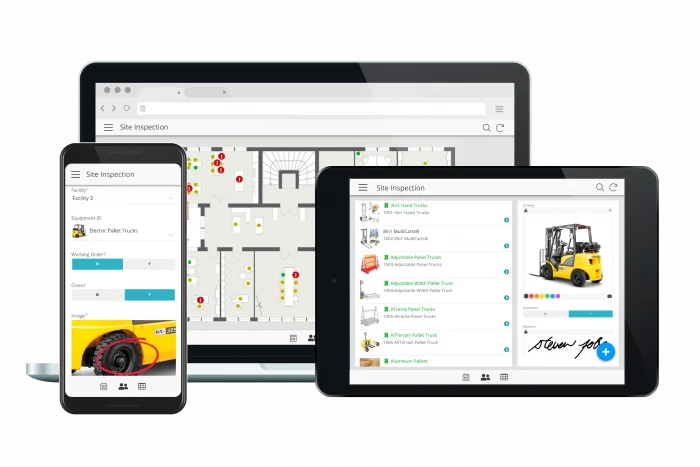

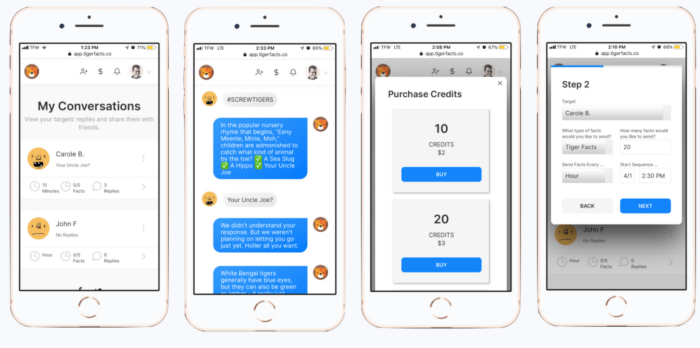
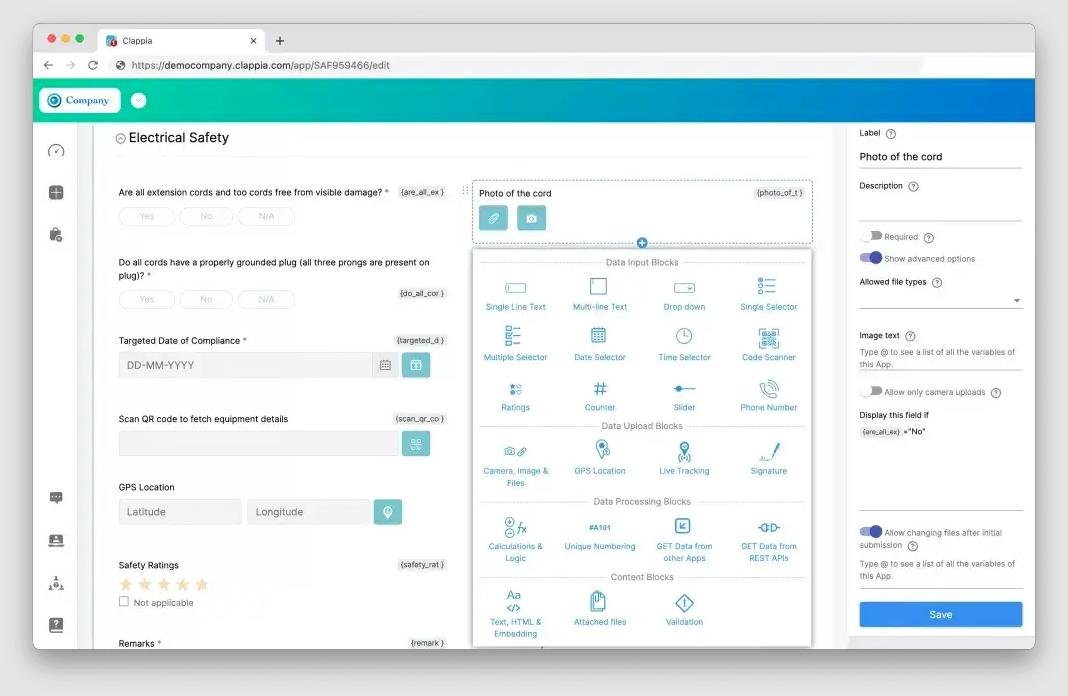

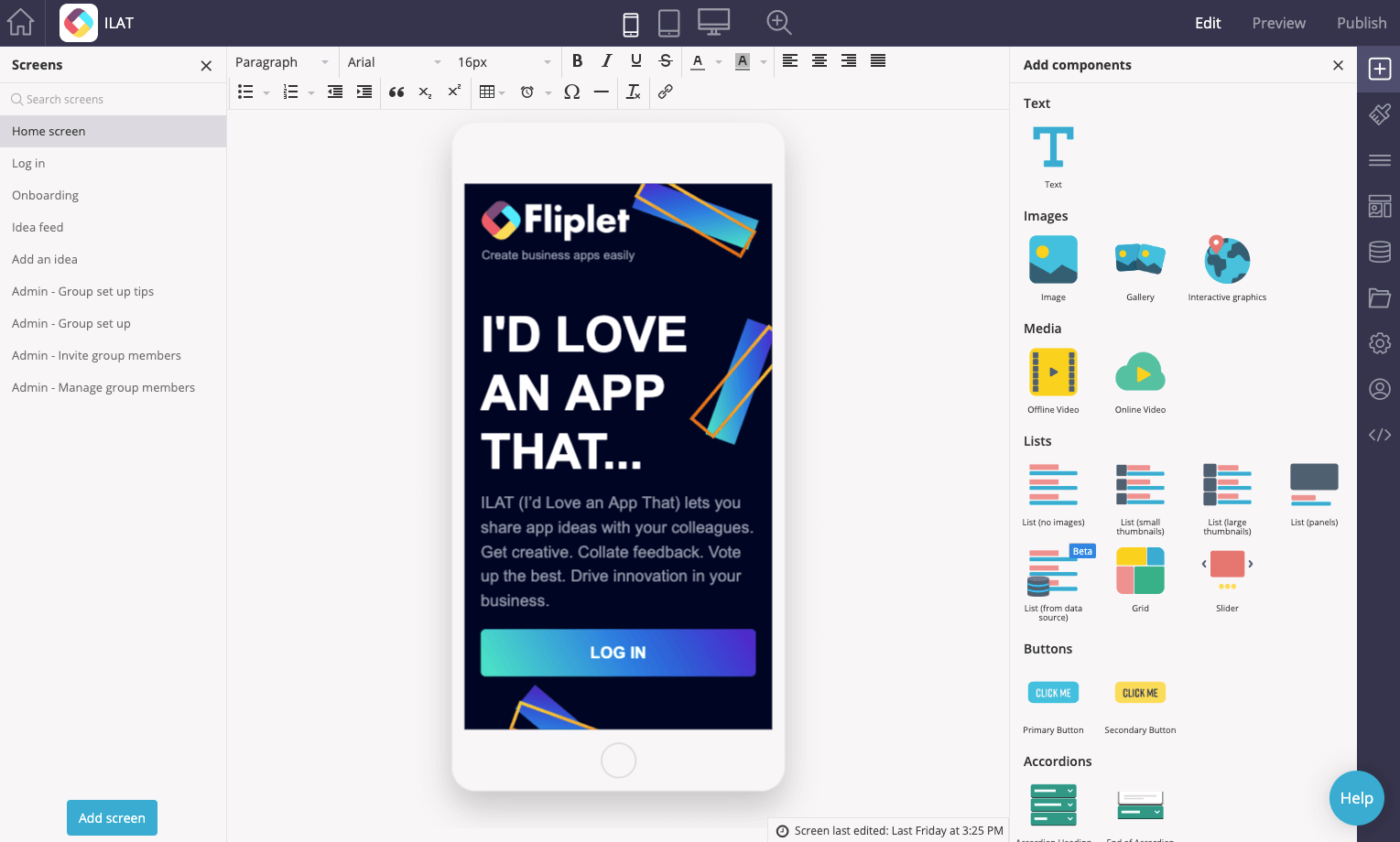




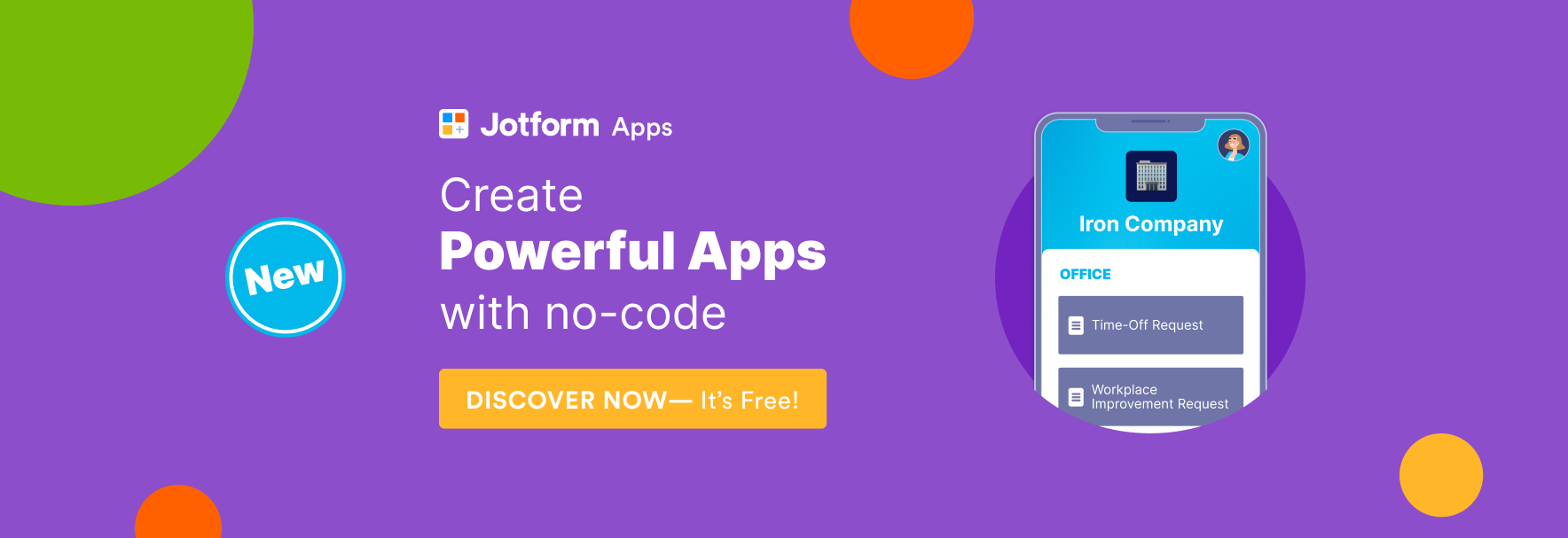


































































































Send Comment: